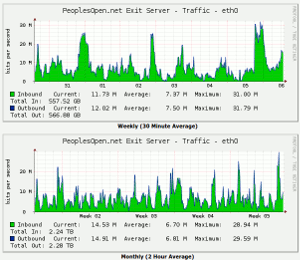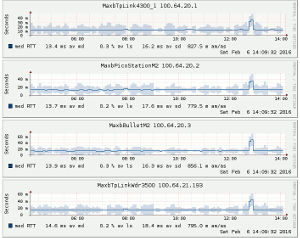Frequently Asked Questions
The People's Open Network is a mesh network. This makes it different from what most people imagine to be "the Internet," though it is compatible with and can perform the same functions as traditional internet.
What is the People's Open Network?
The People's Open Network is a community-owned and -operated wireless mesh network. We use open source, peer-to-peer infrastructure to connect residences and businesses across neighborhoods in the San Francisco Bay Area. The decentralized, peer-to-peer nature of these networks makes it different from what most people imagine to be "the Internet." Most people access "the Internet" by paying for a monthly subscription with a corporate service provider like Comcast or AT&T. One can imagine this as more of a hub and spoke model to connect to each other and others outside of their local area. A mesh network is different in that it: 1) enables people to connect directly to each other within local intranets — much like a Local Area Network (LAN); 2) allows those on the network to share bandwidth to the wider Internet; and 3) is public infrastructure commons, instead of being privately-held and controlled infrastructure. In these and other ways, this makes it more like the decentralized and participatory Internet that many originally envisioned. It is still compatible with and has the capability to perform the same functions at "the Internet" (though those services need to be made available on the local network). People's Open Network also works with communities to build and operate wireless mesh networks. We provide open source software, off-the-shelf hardware, and educational materials used to host workshops, train operators, and install nodes. Our network has over 40 nodes in the San Francisco Bay Area sharing paid internet subscriptions with unconnected neighbors. We’re currently working on building access to gigabits of donated bandwidth and connecting a homeless camp in Berkeley. We are a project of Sudo Mesh, a 501c(3) incorporated non-profit that supports and works with communities to expand digital literacy and build their own wireless networks.
What's the mesh? And why do we need one?
The mesh is a decentralized, peer-to-peer network of computers (or nodes). Each node in the mesh is responsible for routing messages to and from other nodes that it's connected to. A mesh is resilient because there is no single point of failure. If an individual node stops working, the rest of the mesh network will still work. This also means that a kind of political power is distributed — the responsibility of keeping the network functioning does not rest with any one node. In practice, some nodes may still be more important than others, but in general, ownership of the network is shared.
What are nodes?
In the People's Open Network, our nodes are wireless routers (see Hardware). Normally, people use routers like these to connect devices at home (their LAN, or local area network) to the internet (the WAN, or wide area network) through their Internet Service Provider's infrastructure (e.g. telephone lines, coaxial cable, fiber). On People's Open, your router is the network infrastructure. It looks for and connects to other nearby nodes over WiFi, and this is what creates the mesh (the MAN, or mesh area network). This MAN connects nodes that are physically near each other. If you'd like to get a node suitable for the People's Open Network, you can buy a compatible, off-the-shelf router and flash it with the appropriate firmware by following our guide.
Or, if that seems too complicated, come by one of our meetings and we'll help get you setup with a router so you can join the network.
Why do we need a mesh network?
In short: access, privacy, and ownership. As of 2016, about 20% of households in Oakland have no broadband internet access whatsoever. An additional 9% only have access through their mobile devices (2016 American Community Survey). Those that do pay for a broadband connection have little or no choice in their Internet Service Provider, which is almost certainly a for-profit entity incentivized to collect and sell its clients' browsing data. Once a community owns its own infrastructure, the tables are turned. You can provide free or low-cost internet access to vulnerable community members, guarantee net-neutral access to websites and services hosted on the mesh, and browse without worrying about what your ISP might be doing with your data to make more money.
What are the benefits of joining?
1) Reduced internet costs: Neighbors can share an ISP subscription or take advantage of future bandwidth donated to peoplesopen.net. 2) Disaster-proof infrastructure: In the event of a natural disaster the mesh network can be used to reach out to your neighbors if other infrastructure is damaged ie. cell towers, landlines, big internet. 3) Censorship-proof infrastructure: There is no single point of failure to shutdown the mesh in the event of government censorship or anti-net neutrality actions taken by your isp ie; throttling, price increases, etc; 4) Democratic communications: Open source services that respect your privacy are run on the network that provide an alternative to closed sourced platforms like Facebook, Youtube, etc.
How do I get a node and join the network?
If you'd like to get a node suitable for the People's Open Network, you can buy a compatible, off-the-shelf router and flash it with the appropriate firmware by following our guide. Or, if that seems too complicated, come by one of our meetings and we'll help get you setup with a router so you can join the network.
Extender Nodes consist of Ubiquiti routers such as these:


Dimensions: 6.46 x 2.83 x 7.83" (left) and 6.3” x 3.15” x 1.18” (right)
...which are powered over ethernet cable that would be run to home nodes (routers) that look like this:

Can I get internet access through the mesh network?
Yes, the speed varies depending on how many users are online and how much bandwidth is being donated to the network.
Do I need to pay anything to join the network?
No. But if you're able to, we suggest buying your own equipment, which is a one-time expense (about $100). A router costs around ~$20 and you can, optionally, increase your range with an extender node for $60-80. Free equipment is available to those who can't afford it.Who pays for the bandwidth?
Most of the bandwidth is donated by people that own nodes connected to the internet through traditional Internet Service Providers. In the future, we will be using donated bandwidth from the Internet Archive and Paxio.
How will hosting a node impact my internet use?
In the short term: You choose how much bandwidth you’re willing to share with the public network (eg; 10%) and any network issues would be the same as current - attributable to your ISP. The mesh can enable you to drop to all but one ISP subscription in the building, residents will have the password to the private SSID, and the building as a whole can save significant money. In the long term: We are working with the Internet Archive and Paxio (a local ISP) to get gigabits of donated bandwidth fed into the network - meaning that once the infrastructure is in place, you can eliminate your current ISP subscription and roll with truly free high-speed WiFi!
Is there any security risk?
No network is in an of itself secure - as we like to say, “Never trust the network!” It’s up to end users to practice good “security hygiene” - eg; using HTTPS for encrypting their web browser traffic, encrypted email and Signal for secure communications, etc. We would love to coordinate a hands-on digital security workshop to train anyone interested in learning more about the topic.
Are people liable for any content that runs over the network?
Traffic over the open public ssid (peoplesopen.net) is routed through a server run by Sudo Mesh, so we handle any copyright notices or DMCA takedown requests. Residents and collective members will have access to a private SSID with full bandwidth allotted.
What is the risk of EMF radiation?
Cellphones radiate exponentially more EMF than WiFi routers.
Where will the antennas go?
Our routers contain internal antennas but you can connect an external antenna or extender node to your router to increase your signals range. We typically mount antennas outside a window or attached to a pole on the roof.
Who maintains the antennas? What happens to them when we replace our roof?
We intend to be around for a long while, and our volunteers will happily maintain the nodes - and teach you how as well (see https://peoplesopen.net/workshop)! We can coordinate with you to remove and store them in the eventuality of rooftop repairs.
What's the plan if People's Open dissolves?
The equipment will be owned entirely by you, and how you resolve any conflicts is entirely up to you :)
Ok, but I want to help out more?
Glad to hear! Let's see how you can help.


